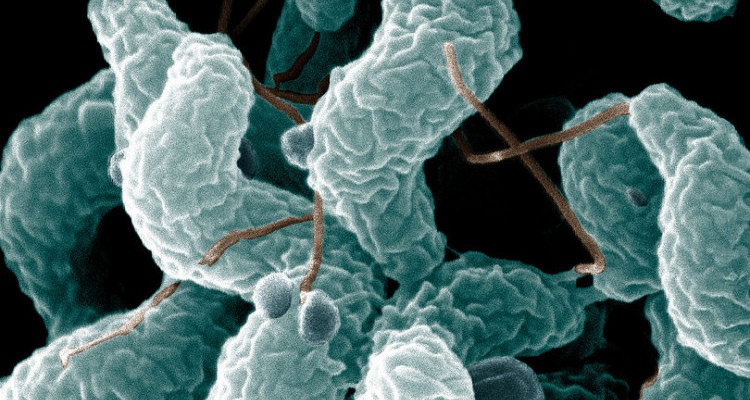Raising your chickens is rewarding because you get fresh eggs and fresh chicken meat, and it’s fun to watch them grow, play, and produce. But while your backyard buddies offer these rewards freely, there could be a price to pay for raising chickens if you’re not careful about how you handle them.
There are health risks associated with poultry. It is a good idea to find out what these risks are before you find yourself falling ill with something that could have been easily avoided with a little due diligence.
Three types of bacteria that domesticated chickens carry, whether meat birds or laying hens are Salmonella, Campylobacter, and E. coli. There are also viruses lurking around these days like avian influenza, also known as bird flu. Let’s take a look at each of these.
Salmonellosis
Salmonellosis is an infection that is caused by eating food that has one of several types of Salmonella bacteria on it or in it. This is from the Minnesota Dept of Health “Salmonella live in the intestinal tracts of animals, including birds. Salmonella are usually transmitted to humans by eating foods contaminated with animal feces.”
It is a myth that Salmonella isn’t inside eggs, but only on the shells. According to the CDC, Salmonella can form inside an egg while the egg is formed inside of a chicken before a shell develops. This is simply overcome by cooking eggs thoroughly.
Just as an aside, I know a bodybuilder who has sickened himself with Salmonellosis several times by eating raw eggs. He says it is just part of the game. Who am I to argue with a guy that can lift me over his head and toss me across the room?
Salmonellosis symptoms include diarrhea, fever, abdominal cramps, and vomiting. It can start to be noticeable in as little as 12 hours but can take a few days to show up and usually lasts 4 – 7 days.
Treatment consists of waiting it out in normal cases. Drink extra fluids to replace those expelled due to diarrhea or vomiting. In severe cases, antibiotics can be used. Of course, you should seek medical advice in such a case.
Campylobacter
Campylobacter is a bacterium that typically causes diarrhea. It’s not usually as severe as Salmonella unless one has an underlying health issue that allows this opportunistic pathogen to flourish.
Treatment is again simply riding it out unless it turns aggressive. Then an antimicrobial would be in order
This pathogen’s number one carrier is poultry. You can become ill in 24 -72 hours after contact and suffer from diarrhea, abdominal cramps, and pain. The reason I say it’s not as severe as Salmonellosis is that it is sensitive to a person’s gastric juices. It takes a pretty high dose of the bacteria to make a healthy person sick.
E. Coli
E.coli (Escherichia coli) is a bacterium that is found naturally in the intestines of warm-blooded animals. Being one of many coliform bacteria, not all E. coli will make you sick. I am going to talk about the ones that will.
E.coli is passed from a chicken’s body out into the environment in its droppings. Once exposed to the air the bacteria thrive for a few days, then dissipate over time. E.coli is the bacteria responsible for many of the food recalls that occur in the food industry.
E.coli infections are caused by ingesting food or water contaminated with the pathogen. The E.coli enters your intestines and starts releasing toxins that make you develop symptoms including Diarrhea (usually bloody), fever, stomach pain, and vomiting.
Anyone who comes into contact with a disease-causing strain of E. coli can become infected. People who are at greatest risk are:
- The very young (especially newborns and children under 5)
- The elderly
- People who have weakened immune systems or pregnant people
- People who travel to certain countries
Treatment once again is waiting it out, but if symptoms go on for over three days you will want to seek medical advice.
Avian Flu or Bird Flu
Viruses naturally spread among wild birds and can infect domestic poultry and other animals. Some avian flu strains can cause severe illness or death in infected domestic poultry flocks. While avian influenza viruses usually do not infect people, there have been rare cases of human infection.
The bird flu can hit your flock at any time by visiting wild birds. At this writing, there are geese, ducks, and other migratory birds winging in from parts unknown to me. Any one of our feathered friends could be harboring a strain of avian influenza that could wipe out my entire flock.
Another way that disease, including avian flu, is spread is by visiting vehicle tires and used chicken-raising equipment.
The best thing you can do to protect your birds from getting avian influenza is to prevent them from coming into contact with wild waterfowl like ducks, geese, cranes, pipers, etc. I’m not sure if you have any frequency of penguin visits, but they can carry it too. Visitors’ tires should be hosed off prior to entering the chicken’s living areas.
The Big Four
Okay, so we’ve discussed the big four disease-causing bacteria and viruses. Now what? How do we mitigate the possibility of infection? I’m glad you asked.
Wash your hands with soap and water after touching live poultry. Do the same after cleaning any waterers, feeders, roosts, and nesting boxes. You get the idea. If you come into contact with your birds, wash your hands afterward.
Since most pathogens are ingested, don’t snuggle with your birds while showing your friends how adorable they are. Don’t put your hands to your face to cover your mouth when you cough or itch your nose. Don’t eat around your chickens. Keep all of your chicken-raising equipment, including barn shoes outside of the house,
Stay in a well-ventilated area like outdoors when cleaning or working on any equipment or materials used to raise or care for your chickens. Keep your chicken coop clean. This means shoveling out manure, changing bedding in nesting boxes, and spraying for mites and chicken lice.
Do as I say, not as I do.
Look, I know that we all love our chickens and treat them as we would any other pet. I am so guilty of breaking the rules that it pains me to write this article. I did get sick last week though. I won’t thrill you with the details, but I did lose a couple of pounds and I am quite thirsty. Be careful handling your chickens.
Thanks for reading. Leave a comment if you would be so kind. I’ll get back to you right away.
Dave
Chickenmethod.com





While it is true that Avian Influenza can be a problem, there are many ways to reduce the transmission of it. You mentioned keeping your equipment clean, washing your hands thoroughly, don’t handle your chickens, and then touching anywhere on your face.
You must also limit the number of vehicles that visit your property where you are raising your chicken for meat or eggs. The virus has been known to go from one chicken farm to another by the grain truck. Have a tire washing station at the entrance for them to wash before entering and when leaving. This will help slow the spread of the virus.
As always, keeping good hygiene on your property will help reduce the possibility of any contaminants causing you problems when raising your flock.
Jerry
Yes, you are absolutely right. Diseases can travel on tires, cages, and any equipment that is shared among chicken-raising facilities. Buying used equipment including waterers, feeders, and nesting boxes is always a crapshoot. I won’t do it. I believe I will use your edit — thanks!
My articles are mostly written for the backyard enthusiast. I really need to be mindful that the bigger houses have more problems than the backyard flocks and must be considered when talking about chickens. Thanks a lot, Jerry. I appreciate your input immensely.
That was interesting to learn about actually being inside the egg, I had never heard that before. It is also amazing to me being in healthcare that the rules for avoiding pathologies are almost always the same: wash hands regularly and stay in well ventilated areas. If we could do this consistently as a society a majority of the pathologies that plague us would almost disappear. It also seems obvious to me that you wouldn’t treat your chickens like pets but when you are raising any animal you do become attached and by human nature we like to show affection. Great post. Thanks.
I used to think that eggs right out of the chicken were these sterile wonders that are the perfect food inside of the perfect vessel. Then I heard that Salmonellosis could be contracted from inside the egg so I researched it and it’s true. Who knew?
I must admit, Brian that my day job is in a wastewater treatment plant. Washing hands constantly is done without thinking. Interestingly, I seldom get sick.
One just gets used to the chickens and stops thinking about the fact that they are inherently dirty creatures that poo more than any animal of which I have made the acquaintance. I talk to them, scold them sometimes, and ask them questions like – now where did you lay that egg? They really are part of the family.
Thanks, Brian. I appreciate the input very much.